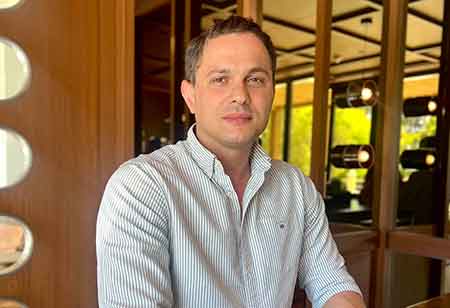Neilos Prapas, Director of Food and Beverage at Ace Hotel & Swim Club Athens, brings extensive experience across hospitality operations and management. He is a collaborative leader who excels in building strong client relationships and driving team success to ensure high customer satisfaction.
In an exclusive interview with Food Business Review, Neilos Prapas shared his views on how people, values, and team culture shape the hospitality experience.
Key Experiences behind Leadership
My journey began on the restaurant floor, working face-to-face with guests. That early exposure to real-time service taught me that hospitality is human. It’s about presence, empathy, and the smallest gestures. As I moved into leadership, I realized that the same applies to managing teams. People don’t just want direction they want to feel seen, supported, and part of something meaningful.
A key turning point was leading a hotel opening where I had to build the Food and Beverage team from the ground up. It taught me that culture eats strategy every time. Now, my leadership approach is built on trust, collaboration, and the ideas that when people feel empowered, they deliver experiences that go beyond expectations.
The Power of Collaboration
Working both on the floor and behind the scenes gave me a holistic understanding of the guest journey. I learned that consistency doesn’t happen by accident, it’s the result of countless micro-decisions and real-time communication between teams. Whether it’s a perfectly timed greeting or a beautifully plated dish, details matter. But more than that, relationships matter.
I focus on creating an internal culture where collaboration flows between the kitchens, bar, service, and events, so that everyone feels ownership. That sense of connection shows in how we treat guests. It’s not about service that’s robotic, it’s about service that feels personal, intuitive, and real.
Sustainability as a Standard
Sustainability and local sourcing are no longer trends. They are expectations. Today’s guests are mindful of where their food comes from, how it’s made, and what impact it has. At Ace Hotel & Swim Club Athens, we see this as an opportunity to tell richer stories through our menus, our sourcing partnerships, and even our waste practices.
Hospitality is human. It’s about presence, empathy, and the smallest gestures.
Working with local farmers and producers allows us to build menus with integrity and flavor, while supporting the surrounding community. But sustainability isn’t just about ingredients it’s about systems, culture, and intention. From zero-waste practices in the kitchen to supporting regenerative agriculture, this mindset is shaping the future of F&B in meaningful long-term ways.
Key Strategy to Solve Challenges
One major challenge is finding talent, retaining, and growing the right people. Post-pandemic, priorities have shifted. People want more than a paycheck, they want purpose, flexibility, and growth. We’ve responded by creating clearer development paths, prioritizing team well-being, and involving staff in decision-making.
Another challenge is managing multiple outlets, evolving guest expectations, and supply chain volatility. Our strategy is to remain agile: simplify where needed, empower teams to make decisions, and create feedback loops that keep us aligned. We’ve found that clarity and communication are just as important as innovation.
Turning Crisis into Opportunity
During a fully booked event, we experienced a sudden power outage. It could have been chaos, but because we’d planned for contingencies and invested in team training, we adapted quickly. The team remained calm, we communicated transparently with guests, and even managed to turn the situation into a unique experience, where guests were offered complimentary drinks, and the dim lighting became part of the mood.
What I learned is that operational excellence starts long before a crisis hits. If your team feels safe, respected, and trusted, they will step up and lead in unexpected ways. The human element— more than the playbook—is what makes the difference.
Future Trends in Food and Beverage Management
• Hyper-personalization through data – From dietary preferences to dining patterns, we’ll be able to tailor the F&B experience more intelligently and intuitively.
• Wellness-forward dining – Guests are seeking menus that reflect health, balance, and well-being, without sacrificing flavor or creativity.
• Sustainability by design – Not as an add-on, but as the core of concept development such as circular kitchens, ethical sourcing, and community partnerships.
•
Technology that enhances human connection – Digital tools will continue to streamline operations, but the brands that win will be the ones that keep hospitality human.
Insights for Food and Beverage Leaders
Be curious. Stay humble. Learn how to read both a P&L sheet and the energy of a room. The best F&B leaders I know are part strategist, part therapist, and part creative. You need to think like a guest and lead like a coach.
Work across roles. Understand what it feels like to carry a tray, run a pass, or handle a vendor call. It builds empathy. Finally, invest in people. If you take care of your team, they’ll take care of the experience, and that’s where the magic happens.
Hospitality is about creating moments that feel personal, effortless, and emotionally resonant. It’s not just about food and service, it’s about how people feel when they walk through the door and when they leave. I always tell my team to imagine themselves in the guest’s shoes and to offer the kind of experience they would personally want to receive. That’s the heart of what we do, and what keeps me inspired every day.



